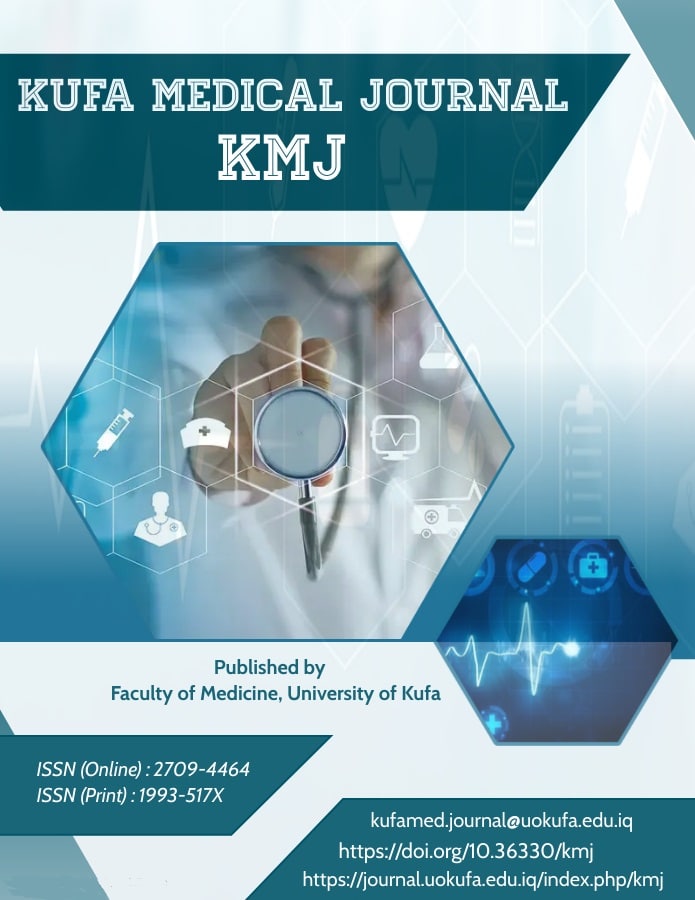Role of Vitamin C Supplementation on Iron Overload and Oxidative Stress in Beta Thalassemia Major Patients in Maysan Province-Iraq
DOI:
https://doi.org/10.36330/kmj.v17i1.1954Keywords:
Vitamin C, Thalassemia major, Iron overload, Oxidative stressAbstract
Background: Vitamin C is a well-known powerful water soluble antioxidant and very powerful iron absorption enhancer. It was used for a long period in the management of thalassemia major (TM) patients hoping to decrease the oxidative stress initiated by iron overload resulted from hemolysis of erythrocytes and frequent blood transfusions (BT). Iron overload from BTs may be exacerbated in patients due to increased absorption of iron from the diet in response to ineffective erythropoiesis or vitamin C supplementation. Aim: To evaluate the impact of vitamin C supplementation on the iron overload and oxidative stress in beta thalassemia major patients Methods: Fifty five children were investigated in this study. Thirty two of them were patients with TM on frequent BTs and oral chelating drug (deferasirox), they were diagnosed by hemoglobin electrophoresis with a mean age of 9±4.3 y. Patients were attendees of the Blood Disease and Thalassemia center in Maysan Province-Iraq in the period between November 2013 and November 2014. Twenty three apparently healthy children with a mean age of 8±3.2 y were included as a control group. Patients were subjected to vitamin C supplementation (200mg/day) for 2 months. Serum; vitamin C, iron, malondialdehyde (MDA), ferritin and UIBC and complete blood count were determined. Results: There were significant increases of serum iron (P<0.05) and ferritin (P<0.05) levels with insignificant increase of serum MDA levels in samples of patients before supplementation when compared with those of the control groups. However, a significant decrease in serum vitamin C levels (P<0.05) and serum UIBC values (P<0.05) were evident during a similar comparison. The results of second samples, in comparison with the results of first samples referred to a statistically significant increase in serum vitamin C and serum iron (P<0.05), non-significant increase in serum ferritin and MDA and non-significant decrease in UIBC. The complete blood count remained the same in both samples. Conclusion Vitamin C is a powerful enhancer of iron absorption from GIT and releaser from intracellular stores than antioxidant agent. Vitamin C must be given with caution and continuous supervision to TM patients. Recommendation: It is essential to study both smaller and larger doses than 200mg with a longer periods and expanded age groups.
Downloads
Downloads
Published
How to Cite
Issue
Section
License
Copyright (c) 2017 Jafar Naser Hussien, Sami Rahem Al-Katib, Salah Hashim Al-Zuhairy

This work is licensed under a Creative Commons Attribution 4.0 International License.
which allows users to copy, create extracts, abstracts, and new works from the Article, alter and revise the Article, and make commercial use of the Article (including reuse and/or resale of the Article by commercial entities), provided the user gives appropriate credit (with a link to the formal publication through the relevant DOI), provides a link to the license, indicates if changes were made and the licensor is not represented as endorsing the use made of the work. The authors hold the copyright for their published work on the KMJ website, given that KMJ is responsible to appreciate citation for their work, which is released under CC-BY-4.0 enabling the unrestricted use, distribution, and reproduction of an article in any medium, provided that the original work is properly cited.











